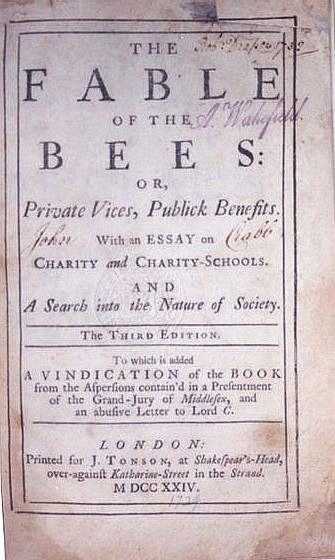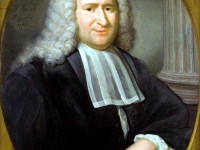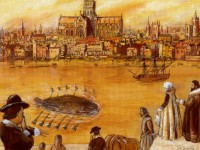
The Fable of the Bees by Bernard Mandeville, 3rd edition, 1724
On November 15, 1670, Dutch philosopher, political economist and satirist Bernard Mandeville was born. He became famous for The Fable of the Bees, a satire that suggests many key principles of economic thought, including division of labor and the “invisible hand“, seventy years before these concepts were more thoroughly elucidated by Adam Smith.
“They that examine into the Nature of Man, abstract from Art and Education, may observe, that what renders him a Sociable Animal, consists not in his desire of Company, Good-nature, Pity, Affability, and other Graces of a fair Outside; but that his vilest and most hateful Qualities are the most necessary Accomplishments to fit him for the largest, and, according to the World, the happiest and most flourishing Societies.”
– Bernard Mandeville, The Fable of the Bees (1714)
Bernard Mandeville – Background
Not very much is known about the life of Bernard Mandeville. Mandeville was descended from a Walloon captain in the army of the Duke of Alba who had married and settled in the north of the Netherlands around 1574. The family was of Huguenot origin. Among Fernando’s descendants were eminent physicians. Bernard was baptized at the Gereformeerde Kerken in Nederland in Rotterdam. Mandeville studied at the University of Leiden from 1685 to 1689, first philosophy with his thesis De brutorum operationibus (1689), then medicine .He received his degree in medicine in 1691 and his thesis was titled De chylosi vitiata (1691). He seems to have practiced first in the Netherlands for a short time as a physician for nervous and stomach disorders. In 1693 he moved to London, where he settled as a physician and married an Englishwoman, Ruth Laurence, in 1699. They had a daughter and a son. He had good relations with the British ruling class; for example, he was friends with the Lord Chancellor Thomas Parker, 1st Earl of Macclesfield, the father of George Parker.
The Fable of the Bees
“Bare Virtue can’t make Nations live
In Splendor; they, that would revive
A Golden Age, must be as free,
For Acorns, as for Honesty.”
– Bernard Mandeville, The Fable of the Bees (1714)
Mandeville began a successful writing career in 1703. After English animal fable adaptations and a verse grotesque, he anonymously published the satirical poem The Grumbling Hive in 1705 as a sixpenny pamphlet, which was in such high demand that a bootleg appeared that same year. Mandeville gradually expanded the text with annotations, essays, and dialogues into the present version of the The Fable of The Bees: or, Private Vices, Public Benefits. Mandeville had the text further supplemented published in 1723. In 1729, a second part of the Bee Fable was published, consisting of six dialogues. It, too, went through several editions and was translated into German in 1761. A sequel to the second part, An Enquiry into the Origin of Honour and the Usefulness of Christianity in War, appeared in 1732. The Fable of the Bees consists numerous key principles of economic thought, such as the division of labour and the famous invisible hand. Mandeville describes a well working community of bees until the bees suddenly turn into honest and virtuous beings. Their community collapses due to the lack of the desire for personal benefits.
Provocative Ethical Views
The provocative ethical views Mandeville formulated in the Bee Fable already sparked a lively debate among contemporaries, who almost universally rejected his views. Mandeville explained that vice was necessary for economic prosperity, which was a quite scandalous point of view. Mandeville and also Adam Smith [3] expressed that individual’s collective actions may lead to a public benefit. However, Smith believed in a virtuous self-interest which results in invisible co-operation and that there was no need for someone to garner the benefit. Mandeville however thought that politicians had to ensure that the people’s passions really resulted in public benefits. Back in the day, Mandeville’s ideas were seen as degrading in concerns of the human nature.
Critical Reception
That personal virtue (frugality, peacefulness) was less conducive to the progress and prosperity of society than luxury, waste, war, and exploitation aroused opposition. The Middlesex High Court declared the bee fable capable of overthrowing “all religion and civil government,” which Mandeville opposed in a “Justification” (in the third edition of 1724). He met with opposition, especially from the idealist philosopher George Berkeley (1685-1753) and from the economists Francis Hutcheson and Adam Smith. Smith, however, adopted many of his examples.
A Modest Proposal
His A Modest Defense of Publick Stews, published in 1726, advocated the establishment of public brothels and the medical control of prostitutes. In doing so, he named – in an unusually frank manner for the 18th century – the clitoris as the pleasure-giving center of female desire. The writing contains a sensitive and sophisticated gender psychology for the time in light of various querelles des femmes. Jonathan Swift‘s satire A Modest Proposal, published somewhat later, probably alluded to the title, which had already become proverbial by 1729.[4]
Bernard Mandeville died in January (19th or 21st) 1733/4 at Hackney.
Bart van Heriknutzen, 2.1 The Fable of the Bees, [11]
References and Further Reading:
- [1] Bernard Mandeville at Britannica
- [2] Bernard Mandeville at the Encyclopedia of Philosophy
- [3] Adam Smith and the Wealth of Nations, SciHi Blog
- [4] The Wonderful Worlds of Jonathan Swift, SciHi Blog
- [5] Cook, Harold John (1999). “Bernard Mandeville and the Therapy of ‘The Clever Politician’“. Journal of the History of Ideas. University of Pennsylvania Press. 60: 101-124..
- [6] Horne, T. A. (1978), The Social Thought of Bernard Mandeville: Virtue and Commerce in Early Eighteenth Century England, New York: Columbia University Press.
- [7] Works by or about Bernard Mandeville at Internet Archive
- [8] Mitchell, John Malcolm (1911). “Mandeville, Bernard de“. In Chisholm, Hugh (ed.). Encyclopædia Britannica (11th ed.). Cambridge University Press.
- [9] Kaye, F. B.; Mandeville, Bernard (1988) [1924]. The Fable of the Bees: or Private Vices, Publick Benefits [with a commentary critical, historical, and explanatory]. Vol. I. Liberty Fund.
- [10] Kaye, F. B.; Mandeville, Bernard (1988) [1924]. The Fable of the Bees: or Private Vices, Publick Benefits [with a commentary critical, historical, and explanatory] Vol. II. Liberty Fund.
- [11] Bart van Heriknutzen, 2.1 The Fable of the Bees, Social Sciences – UvA @ youtube
- [12] Timeline of English Satirists, via Wikidata and DBpedia





